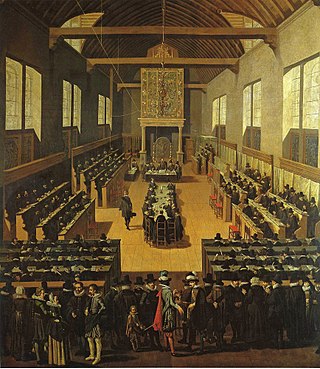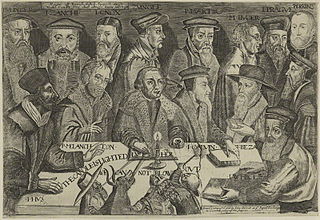
Arminianism is a movement of Protestantism initiated in the early 17th century, based on the theological ideas of the Dutch Reformed theologian Jacobus Arminius and his historic supporters known as Remonstrants. Dutch Arminianism was originally articulated in the Remonstrance (1610), a theological statement submitted to the States General of the Netherlands. This expressed an attempt to moderate the doctrines of Calvinism related to its interpretation of predestination.

Reformed Christianity, also called Calvinism, is a major branch of Protestantism that began during the sixteenth-century Protestant Reformation, a schism in the Western Church. In the modern day, it is largely represented by the Continental, Presbyterian, and Congregational traditions, as well as parts of the Anglican and Baptist traditions.

The Synod of Dort was a European transnational Synod held in Dordrecht in 1618–1619, by the Dutch Reformed Church, to settle a divisive controversy caused by the rise of Arminianism. The first meeting was on 13 November 1618 and the final meeting, the 180th, was on 29 May 1619. Voting representatives from eight foreign Reformed churches were also invited. Dort was a contemporary Dutch term for the town of Dordrecht.

Total depravity is a Protestant theological doctrine derived from the concept of original sin. It teaches that, as a consequence of the Fall, every person born into the world is enslaved to the service of sin as a result of their fallen nature and, apart from the efficacious (irresistible) or prevenient (enabling) grace of God, is completely unable to choose by themselves to follow God, refrain from evil, or accept the gift of salvation as it is offered.

Jacobus Arminius was a Dutch Reformed minister and theologian during the Protestant Reformation period whose views became the basis of Arminianism and the Dutch Remonstrant movement. He served from 1603 as professor in theology at the University of Leiden and wrote many books and treatises on theology.

Franciscus Gomarus was a Dutch theologian, a strict Calvinist and an opponent of the teaching of Jacobus Arminius, whose theological disputes were addressed at the Synod of Dort (1618–19).

Limited atonement is a doctrine accepted in some Christian theological traditions. It is particularly associated with the Reformed tradition and is one of the five points of Calvinism. The doctrine states that though the death of Jesus Christ is sufficient to atone for the sins of the whole world, it was the intention of God the Father that the atonement of Christ's death would work itself out in only the elect, thereby leading them without fail to salvation. According to Limited Atonement, Christ died for the sins of the elect alone, and no atonement was provided for the reprobate. This is in contrast to a belief that God's prevenient grace enables all to respond to the salvation offered by God in Jesus Christ Acts 2:21 so that it is each person's decision and response to God's grace that determines whether Christ's atonement will be effective to that individual. A modified form of the doctrine also exists in Molinism.

Simon Episcopius was a Dutch theologian and Remonstrant who played a significant role at the Synod of Dort in 1618. His name is the Latinized form of his Dutch name Simon Bisschop.
The Remonstrants is a Protestant movement that split from the Dutch Reformed Church in the early 17th century. The early Remonstrants supported Jacobus Arminius, and after his death, continued to maintain his original views called Arminianism against the proponents of Calvinism. Condemned by the synod of Dort (1618–1619), the Remonstrants remained a small minority in the Netherlands. In the middle of the 19th century, the Remonstrant Brotherhood was influenced by the liberal Dutch theological movement.
The Five Points of Calvinism, occasionally known by the mnemonic TULIP, constitute a summary of Reformed soteriology. Named after John Calvin, they largely reflect the teaching of the Canons of Dort. The Five Points of Calvinism assert that God saves every person upon whom he has mercy, and that his efforts are not frustrated by the unrighteousness or inability of humans. They have been summarized under the acrostic TULIP: total depravity, unconditional election, limited atonement, irresistible grace, and the perseverance of the saints.
The Five Articles of Remonstrance or the Remonstrance were theological propositions advanced in 1610 by followers of Jacobus Arminius who had died in 1609, in disagreement with interpretations of the teaching of John Calvin then current in the Dutch Reformed Church. Those who supported them were called "Remonstrants".

The history of the Calvinist–Arminian debate begins in the early 17th century in the Netherlands with a Christian theological dispute between the followers of John Calvin and Jacobus Arminius, and continues today among some Protestants, particularly evangelicals. The debate centers around soteriology, or the study of salvation, and includes disputes about total depravity, predestination, and atonement. While the debate was given its Calvinist–Arminian form in the 17th century, issues central to the debate have been discussed in Christianity in some form since Augustine of Hippo's disputes with the Pelagians in the 5th century.
Roger Eugene Olson is an American Baptist theologian and Professor of Christian Theology of Ethics at the Baylor University.
The Three Forms of Unity is a collective name for the Belgic Confession, the Canons of Dort, and the Heidelberg Catechism, which reflect the doctrinal concerns of continental Calvinism and are accepted as official statements of doctrine by many Calvinist churches.

Reformed Christianity originated with the Reformation in Switzerland when Huldrych Zwingli began preaching what would become the first form of the Reformed doctrine in Zürich in 1519.

Arminianism was a controversial theological position within the Church of England particularly evident in the second quarter of the 17th century. A key element was the rejection of predestination. The Puritans fought against Arminianism, and King James I of England opposed it before, during, and after the Synod of Dort, 1618–1619, where the English delegates participated in formulating the Calvinist Canons of Dort, but his son Charles I, favoured it, leading to deep political battles. The Methodists, who espoused a variant of the school of thought called Wesleyan–Arminian theology, branched off the Church of England in the 18th century.

The Confession of Faith, popularly known as the Belgic Confession, is a confession to which many Reformed churches subscribe as a doctrinal standard. The Confession forms part of the Three Forms of Unity, which are the official subordinate standards of the Dutch Reformed Church. The confession's chief author was Guido de Brès, a Walloon Reformed pastor, active in the Low Countries, who died a martyr to the faith in 1567, during the Dutch Reformation. The name Belgic Confession follows the 17th-century Latin Confessio Belgica. Belgica referred to the whole of the Low Countries, both north and south, which today is divided into the Netherlands and Belgium.
Reformed orthodoxy or Calvinist orthodoxy was an era in the history of Calvinism in the 16th to 18th centuries. Calvinist orthodoxy was paralleled by similar eras in Lutheranism and tridentine Roman Catholicism after the Counter-Reformation. Calvinist scholasticism or Reformed scholasticism was a theological method that gradually developed during the era of Calvinist Orthodoxy.
The Counter-Remonstrance of 1611 was the Dutch Reformed Churches' response to the controversial Remonstrants' Five Articles of Remonstrance, which challenged the Calvinist theology and the Reformed Confessions that the Remonstrants had sworn to uphold. The Counter Remonstrance was written primarily by Festus Hommius and defended the Belgic Confession against theological criticisms from the followers of the late Jacob Arminius, although Arminius himself claimed adherence to the Belgic Confession and Heidelberg Catechism till his death. Prior to the Canons of Dort, the Counter Remonstrance of 1611 was the earliest and clearest representation of what is in modern times commonly referred to as the "five points of Calvinism."
The Confession or Declaration of the Pastors which are called Remonstrants, or Remonstrant Confession, was the confession of faith of the Remonstrant brotherhood, published in 1621.













